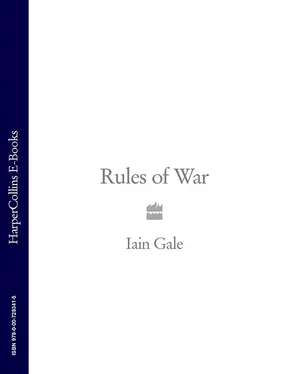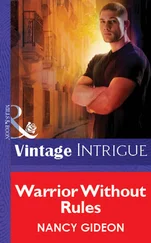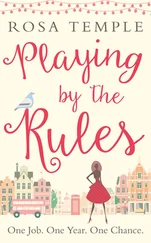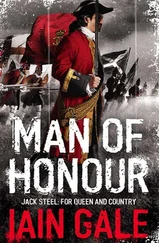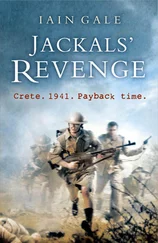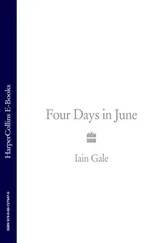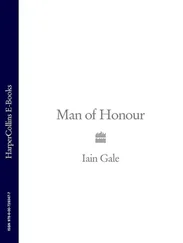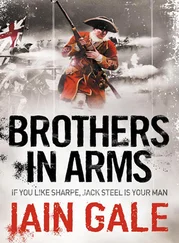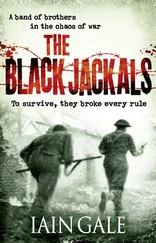‘Good work, McKellar. That’s a sovereign for you.’ He turned to address his regiment: ‘Each one of you men shall have a sovereign for every Papist officer slain today.’
The sergeant saluted his commander with his bloody blade and walked away to discuss the good news with the men and tally their scores.
Steel turned on Argyll: ‘You murdered him. Your Grace, Clare was surrendering. He was offering you his sword.’
‘That man was a Papist and a traitor and he suffered for it. I told you, Steel. I fight not only for my queen and my country. I fight for a greater Britain, for a nation free from such perverse unbelievers. I fight for truth, Steel. For truth. For freedom and against superstition. If you would care to discuss the matter further, I await your pleasure.’
Turning, Argyll walked away from Steel and the others, pausing only to clean his sword blade on the white coat of a dead French soldier.
Steel watched him go in silence and looked down at the body of the Irishman. Around him the Grenadiers were taking the surrender of Clare’s dragoons and he realized that the cannon seemed to have stopped firing. From beyond the town came the rolling noise of musketry and a confused cacophony which he recognized as the sound of one army in full flight and another in pursuit. It seemed that the cornet had been right. The battle was won. He shook his head, and said to no one in particular, ‘If that’s freedom and truth, then I want no part of it.’
He thought of his younger brother, Alexander, a Jacobite who had left the family five years back. His whereabouts were currently unknown although Steel presumed that his allegiance, like that of poor, dead Clare, lay still with the old king and the old monarchy. He thought how easily it might have been Alexander rather than O’Brien who had met his end on the sergeant’s blade. He shivered and realized that one day he might meet him himself on a field of battle. He prayed that it would not be and called down a silent blessing on his brother, wherever he now was. Was it too much to hope that perhaps one day they would be reunited in a Scotland where all might be treated equally and where principle and religious bigotry did not divide families?
Slaughter was at his side. ‘You’re right there, sir. Though I know there’s some among our own lads that’d agree with the duke.’
‘I dare say there are. We’re all fighting for different things, Jacob; praying to different gods. But from what I can see, sometimes there’s no difference between Argyll’s idea of a new world and the blind bloody hatred I thought we might have left behind when Her Majesty came to the throne.’ He looked across to where the body of van Cutzem lay, among those of his men, face down in the bloody dirt. ‘I met a man on this field today who believed that war could be civilized with artificial rules and politeness. I told him that he was wrong and now he’s dead. And he was wrong, Jacob. The only way that we’re going to make a world worth living in, apart from kicking fat King Louis off his throne, is to start realizing that all war is brutal and nasty. It’s kill or be killed. The only winner is the man who gets in the first volley. Clare knew that.’ He pointed after Argyll. ‘And that man knows it too. But we shouldn’t hate like he does. That’s not war. We all have principles, our own codes of war. And we’re all after glory, Jacob. All of us, you, me, Mister Hansam, Mister Williams. Glory and honour. Those are the only two things that matter in this life. Those and life itself. But we’re soldiers, we’re paid to take life. So they’re all that we have left. Rob us of them and you make us no better than common murderers.’
Night came. As far as the eye could see around them dead bodies littered the ground. And most of them wore the white coat of France. They shone pale and motionless in the moonlight. Occasionally a heavy groan would reveal some still with a trace of life. But within minutes the scavenging peasants who roamed the battlefield had found the man and all was silent again.
The heat of the day had gradually given way to night and following orders from Lord Orkney, the regiment, with the Grenadiers in the vanguard, had pressed on in the pursuit. Their passage had been marked by a constant drumming – specific instructions from the high command to drive the enemy before them in fear. The noise had begun to irritate Steel, who was chewing on a large cud of tobacco as he rode, in a vain attempt to salve a headache. Tom Williams, his wound dressed and his arm in a sling, had rejoined them and was fired by the victory.
For miles in the wake of the retreating French army the dead and wounded lay along the road. Steel’s men watched impassively as the French cried out for succour. Occasionally a kindly Grenadier would stop to give them some water. But for the most part they chose to ignore the cries. Hadn’t they suffered enough themselves at the hands of the French in Ramillies? They had left too many good men back on that field to admit thoughts of compassion. Not quite yet. Besides, they had been ordered to advance immediately by their commander. Such was the haste of the enemy’s flight that many had left their possessions back on the field and knew that they would not see them again.
The French army being dispersed, many regiments had separated and drifted into leaderless groups. At times, as Steel’s men advanced through the darkness they would see isolated figures running ahead of them on the road, who at the sound of their approach would dart away into the open country. The French were everywhere, and yet nowhere. They were merely individual fugitives and deserters from an army that had effectively ceased to exist. The pursuit was bloody and relentless and if the British did not quite wear the countenances of murderers, then neither were they all gentlemen.
Hansam rode up to join Steel: ‘It was a great victory, Jack. You may be certain that the bells will be rung in London and Lord Marlborough’s health drunk throughout the land.’
Steel said nothing.
They had halted for a moment in their hurried march towards the west on a rise in the ground above the village of Meldert, near on fifteen miles from the battlefield. Now the day was breaking about them. But this morning the dawn mingled with another glow which the company watched with interest and curiosity. It came from the northwest from the direction of the town of Louvain, a key crossing-place on the defence line of the River Dyle, which lay some seven miles off. While most of the men were puzzled at its source, offering a variety of opinions, Steel was in no doubt. He had seen similar sights too many times before.
Hansam too saw the glow: ‘Fires, Jack? Have the French reformed, d’you think?’
Williams was standing beside them now: ‘What d’you suppose it is, sir? Another battle? Have our cavalry caught up with the French rearguard?’
Steel shook his head. ‘No, Tom. The French haven’t the stomach for another fight just yet. And our cavalry as I hear, are too far to the south. No, that is the sign of an army that has given up the fight. The French are burning their supplies lest they should fall into our hands. That’s the funeral pyre of Villeroi’s army.’
Slaughter and two of the men, Mackay and Cussiter were standing watching the glow as they shared a piece of dried sausage one of them had found in a Frenchman’s haversack. Cussiter spoke as he chewed: ‘Did you see them surrendering? They just laid down their arms like so many fat poltroons and gave themselves up to us. Call themselves soldiers, indeed.’
Mackay nodded: ‘Did you see ’em, Sarge? I couldn’t see nothing but the seats of their breeches.’
Slaughter shook his head: ‘You’d best make what you can of it for now. You can be sure you’ll see more of them just as soon as King Louis can send them back. The French ain’t finished yet.’
Читать дальше
